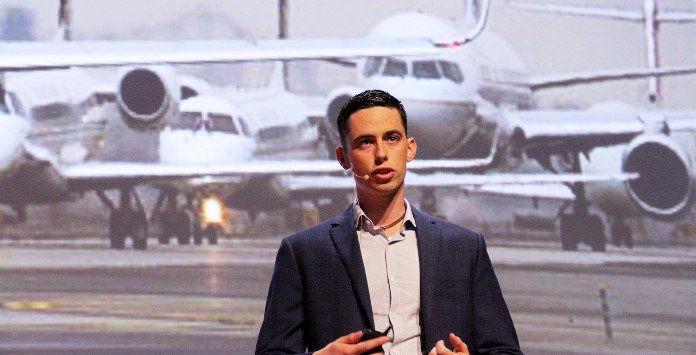Spotlight Series: National Leadership Council member, Felipe Gómez del Campo

Name: Felipe Gómez del Campo (ISEF, 2012)
Job Title: Founder and CEO at FGC Plasma Solutions LLC; MIT Visiting Scientist
About Felipe: Felipe Gómez del Campo is the founder and the CEO of FGC Plasma Solutions Inc, a venture-backed, Boston-based company that uses plasma to fundamentally improve combustion across a wide variety of systems leading to improvements in emissions, fuel consumption and operability. FGC Plasma’s technology has applications in energy, aerospace and national security. Felipe originally started this research as a high school science fair project and now, over six years later he has several patents on the technology and has raised over $5M in funding from the Department of Energy, NASA and others. Felipe was honored at The White House by President Barack Obama as an emerging global entrepreneur.
Education: Bachelor’s degree in mechanical and aerospace engineering from Case Western Reserve University; Masters in aerospace engineering from CWRU.
What does leadership mean to you?
To me leadership isn’t about being the smartest or the most technically capable member of the team. It is more about fusing different sources of information, synthesizing them and communicating a clear vision towards a common objective.
As the world faces a pandemic, a climate catastrophe and numerous other scientific challenges, what are some steps you think the Society can take to address science literacy and support for science?
In many ways, the pandemic highlights the dangers of not listening to science. In climate change, we have an even bigger catastrophe looming. Both of these are predictable and we ignore science at our peril. I think the most important message the Society can communicate here is that thanks to science, we are not defenseless. That thanks to science, we can solve the great challenges we face. Not everyone can or should be a scientist. We would have a very boring world if so but everyone should understand science and its importance.
Policymakers should understand that science is expensive, and takes time and that changing a conclusion with new data isn’t “flip-flopping” as well. As scientists, we need to be better at communicating our work and its importance as well as doing the work necessary to commercialize our developments. Certainly, basic research has an important role to play in informing the world and seeding new technologies. I think this is the type of research most people think about when they imagine a scientist. However, the way we will generate technological solutions to the world’s biggest problems is through translational research, by doing the hard work of using science to develop technologies and then taking those technologies out of the lab.
I think the Society has a very important role of educating the public and policymakers about how science goes from basic research to applied research to working technologies. The Society could also play a role in educating scientists and aspiring scientists to think through translation as an important part of their own research.
What is the most fulfilling aspect of your job?
Going from an idea on a piece of paper to a real working device in the lab or in the field is something that never gets old. It doesn’t always work the first time but when you do get it to work it is an incredible feeling. The most fulfilling part of this is not doing it alone, but rather leading a team to develop breakthrough technologies which will hopefully one day create a positive impact on the world.
What’s the best advice you’ve ever received? Who gave it to you and what was it?
My commencement speaker in college (EY Global Chairman and CEO Mark Weinberger) had a great line in his commencement speech, saying, “when you take your place at the board room table, don’t forget your place at the dinner table.” Especially when you’re leading a startup to try to make a positive impact in the world, it’s easy to think that work is the most important way to spend your time. I strongly believe that no matter what you do in your career, the best thing you can do for the world is to put your family first. Work should always come second.
Did you have a favorite mentor as a young person? What difference did that person make in your life and your approach to problem-solving?
My dad, hands down. He is also an engineer, like his father, grandfather and great grandfather. He taught me how to apply science in practical ways to solve problems. My dad, who also has an MBA, also taught me how to contextualize scientific problems within a business concept. It has been this dual way of thinking, starting with science, but also giving due consideration to the business case surrounding a technological solution that has enabled me to consider both the technical and commercial aspects of the technologies we are developing.
Along with my mom, he also granted free reign to do experiments in our garage as a high schooler (under supervision of course) and it was this work that became my ISEF project and eventually, FGC Plasma.


